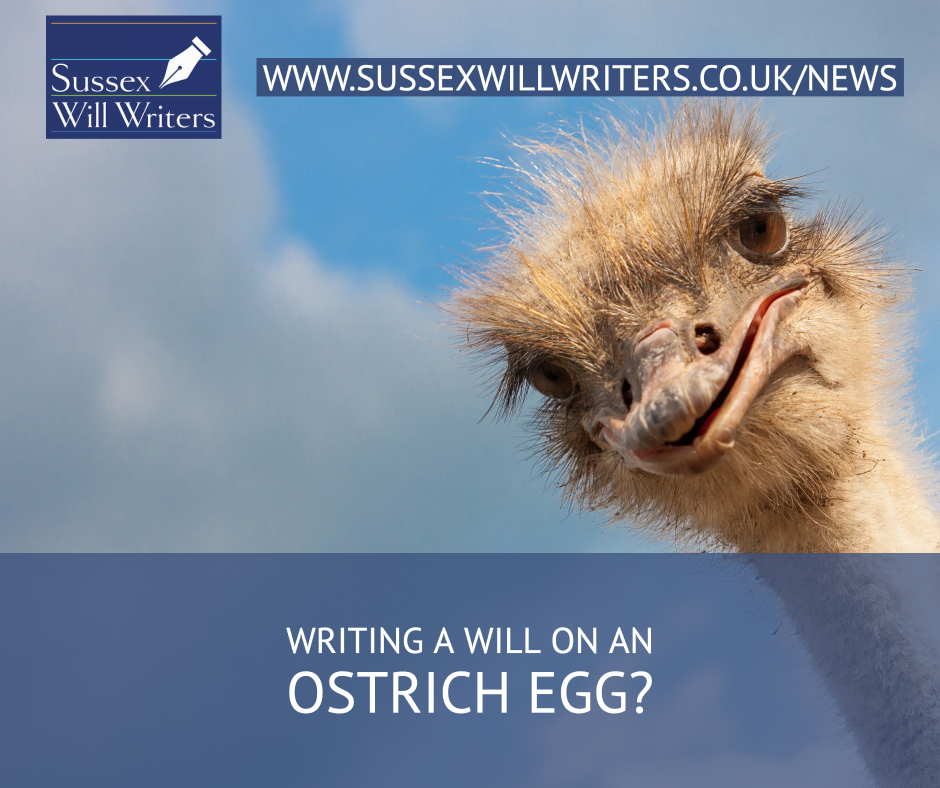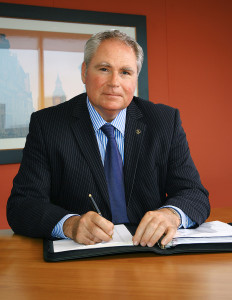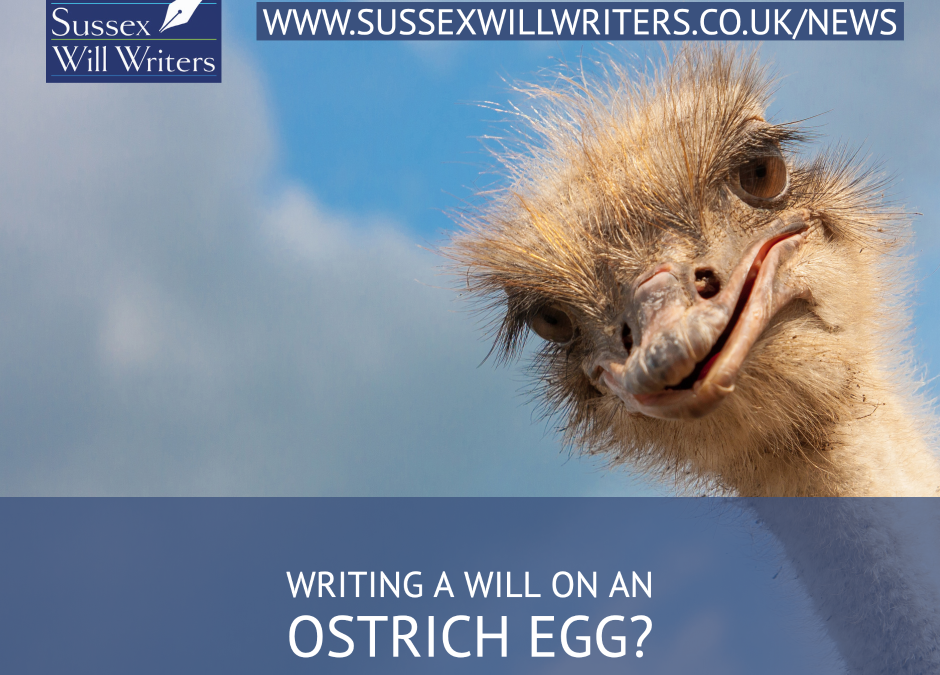
From: The Will Company
Writing a Will on an Ostrich Egg?
To be valid a Will must comply with all of the requirements set out below which is found in section 9 of the Wills Act 1837.
No Will is valid unless:-
- It is in writing and signed by the testator, or by some other person in his presence and by his direction.
- It appears that the testator intended by his signature to give effect to the Will.
- The signature is made or acknowledged by the testator in the presence of two or more witnesses present at the time.
Each witness either:
- attests and signs the Will; or
- acknowledges his signature, in the presence of the testator (but not necessarily in the presence of any other witness), but no form of attestation shall be necessary.
Let us take a look at each point in more detail below.
The Will must be in writing and signed by the testator
The Will must be in writing whether this is handwritten or typed. There is no requirement for the Will to be written on paper. As long as this can be produced to the Probate Registry this will meet the requirements. In the case of Hodson v Barnes (1926) 43 TLR 71 a Will written on an empty ostrich egg shell was once held to be perfectly valid, although we are not in any way suggesting that this is the way forward.
The Will must be signed by the testator using their normal signature. However, what constitutes a signature has been interpreted fairly liberally by the Courts and the following has been accepted in the past – a mark of any shape, a rubber stamp, inked thumb print.
Where the testator is unable to sign the Will, a simple mark is sufficient to validate the Will as long as it is intended to be their signature and that mark is meant to execute the Will. There may be other circumstances where the testator is blind, illiterate or paralysed which will affect their ability to sign the Will. In this case, the Will can be signed on the testator’s behalf and a special attestation clause must be used.
The intention of the testator
The signing of the Will by the testator is evidence of his intention.
Witnesses
One such requirement is that a Will must be signed by the testator (person making the Will) in the presence of two or more witnesses who are present at the same time.
What is a witness?
A witness is a person who signs the Will to verify the signature of the testator. The witnesses sign to confirm that they have observed the testator while he signed his Will (although the witnesses do not need to know that the document is a Will or its contents or sign in the presence of one another).
Both witnesses must be present at the same time and must not leave before the testator has completed his signature.
Where the testator has signed the Will but not in the simultaneous presence of both witnesses then he must acknowledge his signature by words or by conduct in the presence of both witnesses. At the time of the acknowledgement, the witnesses must see or have the opportunity to see the testator’s signature. The signature cannot be concealed or obscured in any way or the acknowledgement will not be valid.
A witness may be called upon at a later date to provide a sworn statement (affidavit) to provide evidence of the circumstances of the signing of the Will if there are any problems with the signatures on the Will, doubts as to the mental capacity of the testator at the time the Will was executed, or any claims that the testator was subjected to undue influence.
Who can be a witness?
Anyone can be a witness unless they are blind, as a blind person is unable to witness a “visible act” such as the signing of a Will.
A witness must be physically present, and they must also be mentally present. A person who is physically present at the time the testator signs the Will but who is asleep, unconscious, under the influence of drink or drugs, or otherwise lacking in mental capacity is not a good attesting witness as they are not aware of the circumstances surrounding the signing of the Will, and will therefore be incapable of providing a statement as to the valid execution of the Will if called upon.
There is no minimum age requirement to be a witness, but the witness must be aware and competent enough to give evidence, so it is advisable to choose witnesses who are over 18. From a practical perspective, it is also sensible to choose witnesses who are younger than the testator and likely to survive them as they may be required to give evidence after the testator’s death.
Lastly, another practical tip is to avoid using a witness from another country since it could be difficult to locate them and communicate with them due to time difference which could subsequently delay the administration of the estate.
A person who is a beneficiary or the spouse of a beneficiary under the Will should not be a witness as under section 15 of the Wills Act 1837, gifts to attesting witnesses are void, and any gifts in the will made to them will fail.
Example
Danielle (testator) leaves Amy her friend, a gift of money in her Will for the sum of £4,000. Amy was asked to be a witness to Danielle’s Will. Danielle passes away soon after. As Amy is a beneficiary in the Will her gift, in this case, will be forfeited and she will not be entitled to it.
It is important during attestation meetings to ascertain who the witnesses are and their relationship to the testator and beneficiaries to prevent the above from occurring.
For practical reasons witnesses should be independent persons who are not mentioned in the Will. Family members witnessing the Will could cause problems and therefore a potential delay in the administration of the estate. Potential witnesses could be friends, neighbours or even work colleagues.
Speak to Sussex Will Writers about organising your estate, Will and Lasting Power of Attorney.
Click to Call us on 01903 533681
or get in touch by emailing: info@sussexwillwriters.co.uk
 Sussex Will Writers
Sussex Will Writers
T: 01903 533681
M: 07734 744886
E: info@sussexwillwriters.co.uk
Could you do with some FREE, sound advice on:
- Writing a Will – What do I need and how much does it cost?
- Creating Lasting Powers of Attorney – If I was incapacitated who can act on my behalf?
- Property Protection Trusts – Can these really save Care Home Fees?
- Pre-Paid Funeral Plans – With so many to choose from how do I decide which plan is best?

There is so much confusion on these vital areas of estate planning, that sometimes just a chat with an expert in the field can clear up misunderstanding and set out the way ahead, without all the legal jargon.
Or complete the form below
Steve Worsfold
Affiliate Member of the Society of Will Writers
Advising on Wills/Trusts/Probate/Powers of Attorney

Mobile: 07734 744886
Office: 01903 533681
Email: steve@sussexwillwriters.co.uk
Website: www.sussexwillwriters.co.uk
Protecting What’s Precious to You,
Now and in the Future
Sussex Will Writers is proud to support Dementia Friends,
an initiative of The Alzheimers Society
Our business is certified ‘Safe to do business with’ and ‘Code compliant’
by the UK’s largest regulatory body for Will Writers, The Society of Will Writers.
Steve Worsfold has been an Affiliate Member of the Society for 15 years.




